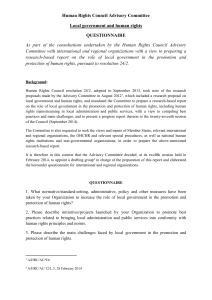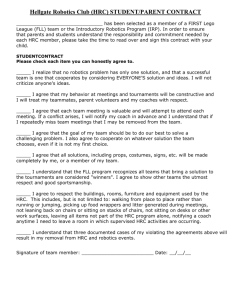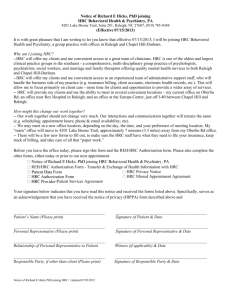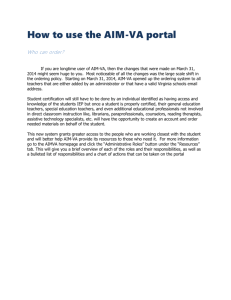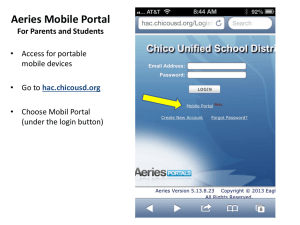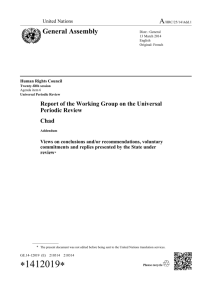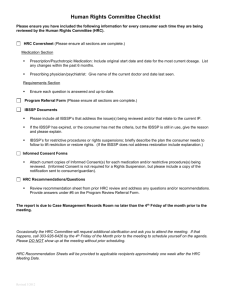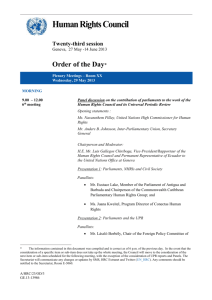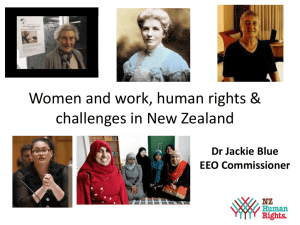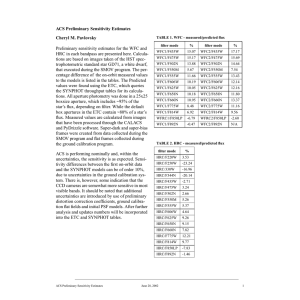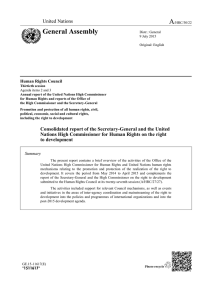concept note - Office of the High Commissioner on Human Rights
advertisement
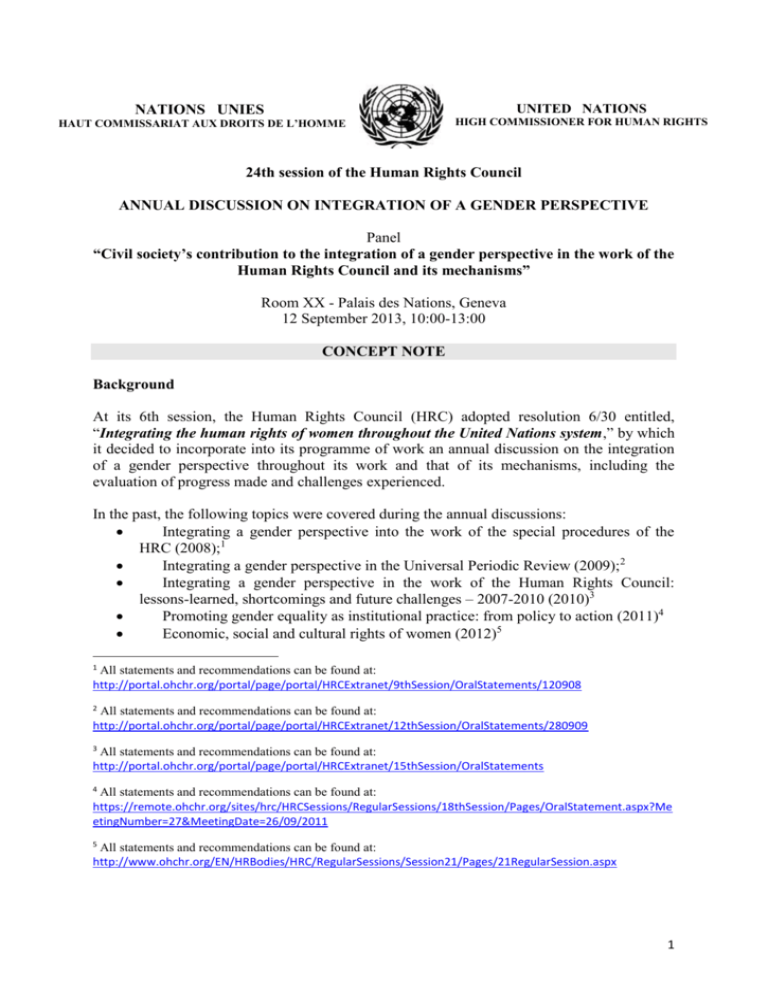
UNITED NATIONS NATIONS UNIES HAUT HAUT COMMISSARIAT AUX DROITS DE L’HOMME HIGH COMMISSIONER FOR HUMAN RIGHTS 24th session of the Human Rights Council ANNUAL DISCUSSION ON INTEGRATION OF A GENDER PERSPECTIVE Panel “Civil society’s contribution to the integration of a gender perspective in the work of the Human Rights Council and its mechanisms” Room XX - Palais des Nations, Geneva 12 September 2013, 10:00-13:00 CONCEPT NOTE Background At its 6th session, the Human Rights Council (HRC) adopted resolution 6/30 entitled, “Integrating the human rights of women throughout the United Nations system,” by which it decided to incorporate into its programme of work an annual discussion on the integration of a gender perspective throughout its work and that of its mechanisms, including the evaluation of progress made and challenges experienced. In the past, the following topics were covered during the annual discussions: Integrating a gender perspective into the work of the special procedures of the HRC (2008);1 Integrating a gender perspective in the Universal Periodic Review (2009);2 Integrating a gender perspective in the work of the Human Rights Council: lessons-learned, shortcomings and future challenges – 2007-2010 (2010)3 Promoting gender equality as institutional practice: from policy to action (2011)4 Economic, social and cultural rights of women (2012)5 1 All statements and recommendations can be found at: http://portal.ohchr.org/portal/page/portal/HRCExtranet/9thSession/OralStatements/120908 2 All statements and recommendations can be found at: http://portal.ohchr.org/portal/page/portal/HRCExtranet/12thSession/OralStatements/280909 3 All statements and recommendations can be found at: http://portal.ohchr.org/portal/page/portal/HRCExtranet/15thSession/OralStatements 4 All statements and recommendations can be found at: https://remote.ohchr.org/sites/hrc/HRCSessions/RegularSessions/18thSession/Pages/OralStatement.aspx?Me etingNumber=27&MeetingDate=26/09/2011 5 All statements and recommendations can be found at: http://www.ohchr.org/EN/HRBodies/HRC/RegularSessions/Session21/Pages/21RegularSession.aspx 1 The integration of a gender perspective throughout the work of the HRC and its mechanisms is a responsibility of the Member States supported by the United Nations Systems. Civil society has a critical role to play in this regard. PP 13 of resolution 6/30 reaffirms the important role that women’s groups, human rights defenders and non-governmental organizations play in promoting and protecting the human rights of women, OP 16 urges all stakeholders to take into full account both the rights of women and a gender perspective in the universal periodic review, including in the preparation of information submitted for the review, during the review dialogue, in the review outcome and in the review follow-up; OP 17 encourages States to prepare the information described in paragraph 15 (a) of HRC resolution 5/1 through broad consultation at the national level with all relevant stakeholders, including non-governmental organizations active in addressing gender issues and the human rights of women and girls Focus and objective The objective of the panel is to discuss civil society’s contribution to the integration of a gender perspective throughout the work of the HRC and some of its mechanisms, including special procedures and of the Universal Periodic Review (UPR). The deliberations will focus on the role played by civil society actors in furthering the protection and promotion of women’s human rights and gender equality through their involvement in the following areas: Contributions to the integration of a gender perspective during HRC sessions when delivering oral and written statements, organizing parallel events and advocacy with member States and other relevant stakeholders Contribution to and follow-up on special procedures country and thematic reports related to women’s human rights and gender equality issues, by bringing cases to the attention of special procedures Submission of a gender sensitive contribution to the UPR reporting process Format of the panel The panel will adopt an interactive format, with no presentation other than the opening address by the High Commissioner. The moderator will define the scope of the theme and animate a lively discussion by asking a different question to each panelist, who will be given a 7-minute slot to answer the question. This exchange will be followed by an interactive dialogue in two sequences, giving voice to comments and questions from Member States and Observers, to which the panelists will reply. Member States and Observers are encouraged to formulate their statements in terms of questions and sharing of experience in order to stimulate a constructive debate. The interactive dialogue will be followed by concluding remarks by the moderator. 2 Interpretation will be provided in the six UN official languages (Arabic, Chinese, English, French, Russian and Spanish) Speakers Chair: HE Remigiusz Achilles Henczel, President of the Human Rights Council Moderator: Nyaradzayi Gumbonzvanda, Secretary-General of the World YWCA (Zimbabwe) Opening statement: High Commissioner for Human Rights Panellists: 1. Mr. Chaloka Beyani, Chair of the Coordination Committee on Special Procedures and Special Rapporteur on the human rights of internally displaced persons (Zambia) 2. Ms. Mozn Hassan Executive Director, Nazra for Feminist Studies (Egypt) 3. Ms. Neha Sood, Advocacy and Policy Officer, Action Canada for Population and Development (India) 4. Ms. Penny Williams, Global Ambassador for Women and Girls (Australia) Outcome The panel will recall challenges, opportunities and good practices by civil society to contribute to the integration of a gender perspective throughout the work of the HRC and its mechanisms. The panel will make recommendations on how relevant stakeholders can best work together to strengthen efforts in this area. The outcome of the discussions will feed into OHCHR’s efforts and guidance in strengthening the engagement of civil society with human rights mechanisms in promoting human rights, in particular women’s human rights and gender equality. 3
